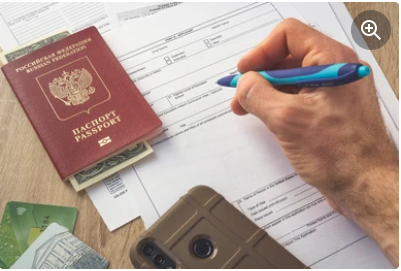Study Visa
How to Apply for a Student Visa in Philippines: Requirements, Cost, Eligibility, & Process
The Philippines is one of the most popular choices among Asian nations due to its expanding economy and literate populace. Like most other nations, the Philippines requires international students to apply for and get a student visa before they are permitted to enroll in Manila-area colleges.
This is why the Philippines is a popular destination for international students seeking to pursue academic interests while learning the English language.
To apply for a student visa, you must be a foreign national of legal age, or at least eighteen years old.
A Special Study Permit (SSP), a temporary visitor’s visa given to foreign people, may be applied for if you are under eighteen or applying for a non-degree program.
You must be of legal age and have documentation showing your ability to pay for your education and living expenses in the Philippines.
Read also: How to Apply for a Student Visa in Thailand: Requirements, Cost, Eligibility, & Process
7 Reasons to Study Abroad in Philippines
Consider enrolling in an international college in the Philippines if you want a 100 percent assurance on the subject. There are numerous advantages to doing this, which we’ve outlined below.
1. Explore A Variety of Cultures
It goes without saying that an international college is a melting pot of various nations and cultures.
Most students who enroll in these programs are foreign-born immigrants or natives who spent part of their upbringing away from home.
You can be sure that the people and personalities you meet at an international college will be different from those you would typically encounter in a conventional educational setting in the Philippines.
Every single student has a distinct and maybe singular culture that is available for everyone to learn about and comprehend, including you.
2. Improve Language Skills
English is the only language that all students, teachers, and other staff members can speak, thus international institutions use it as their primary language of instruction and communication.
Simply put, you’ll be entering an English-speaking atmosphere, thus you’ll need to study and be fluent in it.
In addition to needing English proficiency, international institutions also offer classes in other languages, such as Spanish, French, Chinese, German, Russian, Korean, and Japanese.
Naturally, the native tongue of the host nation, in this case Filipino, may also be taught. That might not be advantageous to residents, but it will surely please international students.
3. Key Takeaway
At all honesty, learning about many fascinating cultures is one of the best things about enrolling in an international institution in the Philippines.
When we confine our perspectives and knowledge to a single culture, we frequently do ourselves a disservice because there is actually so much more to learn about the globe.
The benefit of picking up new languages and talents through extracurricular activities is another perk.
These factors will undoubtedly aid you in succeeding in international and cutthroat marketplaces, along with your prior experience working with people from various cultural backgrounds.
4. Tropical Paradise
A tropical paradise with magnificent beaches and breathtaking landscape is the Philippines. It’s the ideal location to unwind and take advantage of your school break.
After finishing their studies, students can take a well-deserved holiday among the more than 7,000 islands, stunning beaches, and vibrant coral reefs.
You will feel at ease thanks to the lovely weather and tropical climate. If the beach isn’t your thing, explore other national assets including mountains, waterfalls, and jungles.
5. Affordable Living cost
When compared to other Asian nations like Japan or South Korea, the Philippines is very inexpensive.
Fourth, as English is a recognized language in the Philippines, foreign students won’t have any trouble conversing with locals or locating course materials in the language.
6. Modern Infrastructure
The Philippines features cutting-edge infrastructure, including a first-rate road, airport, and port system. Students can easily travel to and from the Philippines thanks to the nation’s excellent international connections.
7. US-based Education System
The Philippines is quickly rising to the top of the list for students looking for a top-notch education.
One of the main draws is the low cost of tuition and living expenditures, which is in addition to the developing economy and tropical climate of the nation.
See also: USA Student Visa Processing Time: How Long Does It Take
What Are The Best Places To Study Abroad In The Philippines?
Many international students offer to study in the Philippines because of the excellent educational opportunities available there and the country’s high level of international exposure.
Here are some beautiful cities in the Philippines that you can Study.
- Metro Manila
- Baguio
- Cebu
- Iloilo
- Davao
Check also: How to Apply for a Student Visa in New Zealand: Requirements, Cost, Eligibility, & Process
What are the Requirements to Study Abroad in the Philippines?
There are requirements you must meet in order to study in the Philippines. But resist giving up! They resemble people in your own country in many ways. The requirements are outlined in this article for your convenience.
- A filled-in visa application form
- Valid passport
- Official letter of acceptance to a school in Poland
- A short CV
- Your school certificates and diplomas
- Evidence of proficiency in the language in which you wish to study
- Confirmation of having funds for studying and living in Poland
- Health insurance
- Passport photograph
- Health insurance
- Residence permits
Read also: How to Apply for a Student Visa in Japan: Requirements, Cost, Eligibility, & Process
Do I Need A Visa To Study Abroad In The Philippines?
If a foreign individual, age 18 or older, wishes to enroll in a course in the Philippines that is higher than high school, a student visa is required.
Additionally, he or she must possess adequate resources to support education in the Philippines.
In order to study in the Philippines, you must be an international student and possess a student visa.
See also: How Long Does It Take to Get a Student Visa in the US, Canada, & UK?
Do You Have To Speak Filipino To Study Abroad in the Philippines?
The ability to speak English and Filipino is sufficient. You must provide proof of your ability in a foreign language at the level required to participate in the lessons when you apply for each course.
Because they conduct a language test before the start of the academic year, several universities do not require certifications in foreign languages.
If the institution you want to apply to demands a test of this kind for a course at a specific level of skill, you can learn from the course description.
Read More: How To Apply For A Student Visa in Italy
How Much Does It Cost To Study Abroad In The Philippines in 2024?
$4,000–$6,000 annually. The total cost of tuition might vary depending on the course, the degree program level, the university, and the city. In general, it costs between $1,000 and 2,500 to attend school in the Philippines.
A quality dorm costs, on average, about 2000 pesos (about $50) per student.
The costs are typically the same for all three higher education levels. Some PhD students change their SSP into a work permit and continue to teach part-time while they are in school.
Fees must be paid in pesos by bank transfer or an international wire transfer. The receipt is required for immigration purposes.
See also: How to Apply For A Student Visa in China
What Are Scholarships To Study Abroad In The Philippines?
There are many prominent public and private colleges in the Philippines that provide excellent instruction and a wide range of course options.
Despite the cost of studying in the Philippines, you can still afford it. Scholarships are a great way for international students in Singapore to receive the money they need to enroll in their desired courses.
There are numerous scholarship options, including public, private, and institution-specific ones. The Philippines offers the following scholarships.
1.The Bill Walsh Scholarship
The ACES Education Fund presents six scholarships each year. One is the Bill Walsh Scholarship, named for the late editor, writer, and inspiration behind ACES.
Scholarships are given out regardless of the student’s citizenship, place of residence, or academic specialty. Previous recipients of scholarships are ineligible.
A candidate who aspires to edit news and exhibits the talent and love of language that Bill Walsh devoted his career to will be awarded the Walsh scholarship. Candidates for the remaining five scholarships should be dedicated to editing written materials and show success in doing so.
2. Ateneo Freshman Merit Scholarship (AFMSS)
One of the most famous universities in the Philippines, Ateneo de Manila University, was founded in 1859 and has a long tradition of producing top-notch graduates, particularly in the fields of law and medicine.
They serve kids in kindergarten through graduate school, as well as those in primary, high school, and college.
In order to better serve their expanding community of international students and international partner organizations, they formed their Office of International Relations in 1994.
3. Freeman-ASIA Program
The Freeman-ASIA Program, created by the Institute of International Education, aims to aid undergraduates from the United States of America who are struggling financially and who want to study in East or Southeast Asia.
The program wants to do this in order to increase awareness of Asia and foster a more tolerant community in the US.
Since the program’s inception in 2001, it has already helped more than 5,000 students attend one of more than 600 colleges.
4. Global Study Awards
The British Council IELTS, International Student Identity Card Association (ISICC), and Student Portals are sponsors of the Global Study Awards, which aims to provide students with the chance to study abroad, explore other cultures, and gain a more global perspective.
Each year, two deserving candidates are chosen to take part in an education abroad program. These individuals are expected to strengthen inclusivity and use their newfound knowledge to advance their own professional endeavors.
5. Agropolis Foundation-SEARCAA Joint Scholarship Program
Through financial assistance for deserving PhD students, the Agropolis Foundation in France and the Southeast Asian Regional Center for Graduate Study and Research in Agriculture (SEARCAA) are working together to advance the field of agroecological transition.
Students will be able to spend 18 months in the Philippines and another Southeast Asian University Consortium for Graduate Education in Agriculture and Natural Resources (UCC) member country, such as Indonesia, Thailand, Malaysia, or the Philippines, under the terms of the scholarship program.
6. Boren Fellowship
Graduate students who wish to participate in an intensive language and cultural study program abroad are eligible for the Boren Fellowship, which is supported by the Boren Awards.
All UU.SS. citizens are encouraged to apply, and they will be given the option to select their country of destination. The application process is primarily targeted at people whose language is less frequently taught and known.
The selected fellows are supposed to return home having learned more about their field of study and having a deeper understanding of another culture.
Read also: How To Apply For A Student Visa in Ireland
What Are The Best Programs To Study Abroad In The Philippines in 2024?
The Philippines as a nation offers a variety of programs to its students in an effort to support their academic endeavors and help them discover their true passions.
We are here to help you discover the Best Programs the Philippines offers.
- Education major
- Engineering and Architecture
- Information Technology
- Agriculture and Fisheries
- Medical Allied Courses
- Maritime and CLOCA or Cruise Line Operations Culinary Arts
- Behavioral Science
- Hospitality Management or HRM.
Read More –Best Law Schools in Colorado | Cost, Requirements, How to Apply
How To Pack For Study Abroad In The Philippines?
We are aware that students demand a comprehensive packing list for their study abroad trip. We all find it annoying when someone claims that something is “common sense” because different products are required for various places with various climatic conditions, and these are not common sense if you have never traveled to these areas.
The presence of some references would be helpful. We have therefore included everything I thought you might require whether studying or traveling abroad in Southeast Asia, particularly the Philippines.
Use the list as you see fit; we wouldn’t expect you to bring everything on it. Check out the list below if you’re wondering how you’re going to make it through your first week in the Philippines.
- School Admission letters (To show it to the custom officer in case they ask).
- Driver’s license / photo ID.
- Printed insurance card
- Outlet adapter
- Sunglasses/ extra eye glasses/ contacts.
- Cell phone (Well I guess no one would forget this one 🙂 )
- Laptop and charger with outlet adapter for the country.
- Go Pro camera w/cords and charger (If you are a photography enthusiast, you can’t forget this one).
- Bath towels (Though you can always buy them overseas, most people would prefer their old towels for comfort).
- Enough prescription medicine for the length of your stay (You need to make sure you are allowed to bring them into the country and that you have documentation, either the prescription or a doctor’s note).
- • MP3 Player/ iPod (for long plane/train rides). Ignore it if your phone has this function.
- Journal/ diary (You’ll be going to many places for your travels. So it’s always nice to have something to write about. Of course I recommend writing a blog and posting it somewhere to share with your friends).
- Backpack (for daily use and as your carry while traveling).
- Plastic bottles for toiletries for use in your carry-on or while traveling (the maximum bottle size allowed in the hand carry luggage is 100ml).
- All sort of clothing
- Toiletries
Read More-Best Law Schools in Colorado | Cost, Requirements, How to Apply
Steps To Prepare You For Study Abroad In Philippines
Do you want to study abroad in the Philippines but aren’t sure where to start? Everything you must do to be well-prepared for your study abroad experience is outlined in this article.
Learning the language is essential for getting the most out of a trip to the Philippines. Yet, a regular course at a language school is typically less difficult than academic work.
1: Eat their food
2: Don’t Skip Attractions
3: keep a budget /Mind your money
4: public transportation should be your friend
5: Blend in /Be local
6: keep in touch with Fam but make friends
Read More –15 Best Boarding Schools in Germany
FAQs
Yes, they do; Filipinos give out scholarships to their international students.
One or two pairs of clothes, in case your luggage is delayed. A book or e-reader for the journey. Also, keep your headphones. Face wipes, gum, hand sanitizer, travel pillow, and itinerary
Yes, it is possible to study abroad even if you don’t have so good grades
Conclusion
As a result, you can observe that the cost of living is a little cheaper in the country and that practically all educational institutions offer their courses at surprisingly reasonable prices.
Because it is less dangerous and more accommodating than other Asian countries in terms of culture and visa requirements, the Philippines is growing in popularity among international students.
Reference
We Recommend
- How to Apply for a Student Visa in Spain: Requirements, Cost, Eligibility, & Process
- How to Apply for UK Student Visitor Visa |Short-Term Study Visa
- How To Apply For A Student Visa in Netherlands
- How To Apply For A Student Visa in Israel
- How To Apply For A Student Visa in Ireland
- How to Apply For A Student Visa in China






